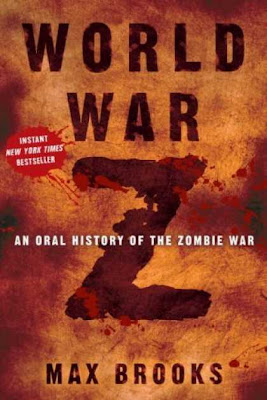Genre: Zombie/Political
Premise: Five years after zombies nearly destroyed mankind, a government official is tasked with finding out the truth about how the zombie uprising started.
About: World War Z is based on the best-selling novel of the same name and is the unofficial sequel to the writer’s first book, The Zombie Survival Guide
. Brad Pitt’s Plan B Productions took on Leonardo DiCaprio’s Appian Way for film rights to the book, with Pitt snagging the rights in a high six figure deal. Marc Forster (The Kite Runner
, Stranger Than Fiction
, Quantum of Solace
) is tabbed to direct. This is a 2008 draft but apparently the project hasn’t been greenlit yet, as they’re still fine-tuning the script. Despite this patience, many people have told me how much they love this draft from Michael J. Straczynsky. Straczynsky has been writing forever, working on such TV shows as The Twilight Zone
, Jake and The Fatman
, Murder She Wrote
, and Babylon 5
. He broke through into the A-list writing group, however, after penning Clint Eastwood’s Anjelina Jolie-starrer “Changeling
.” He recently worked on the big Marvel tentpole pic, Thor.
Writer: Michael J. Straczynsky (based on the novel by Max Brooks)
Details: 118 pages – revised 3rd draft, April 23, 2008 (This is an early draft of the script. The situations, characters, and plot may change significantly by the time the film is released. This is not a definitive statement about the project, but rather an analysis of this unique draft as it pertains to the craft of screenwriting).

It’s fair to say I had absolutely no idea what I was walking into when I picked up World War Z. But ever since that Dead Island trailer hit, I’ve been in zombie mode, searching out anything and everything “zombie.” Then I remembered, probably the most recommended screenplay from e-mailers to me over the past year has been World War Z. I never picked it up because the title implied a generic ride. A bunch of zombies attacking the world. Uhhhh, isn’t that every zombie movie ever made? Little did I know that World War Z would be the single most original execution of a zombie premise I’d ever encountered. I mean this is truly a unique direction to take a zombie film in. The question, of course, is “How unique is too unique?” When do you stray so far from the appeal of a genre/concept that you’re no longer giving the audience what they want? That’s a question all of us face when trying something different, and it’s one that will determine the success of World War Z.
Government official Gerry Lane is being informed by one of his friends in the CIA to get the fuck out of Philadelphia. Like, now. The reason for the immediacy is the tens of thousands of zombies that are storming towards the city. Nobody knows how the situation got this bad this fast, but at this point, it’s everyone for themselves. So Gerry grabs his wife and two kids and hightails it into the country.
Typical zombie movie right? Now we watch as Gerry and other survivors stave off zombies, possibly in a remote town somewhere, ultimately succumbing to their doom?
Uhhhhh no. Not even close.
After succeeding in their escape, we flash-forward five years, to where the zombie threat has been neutralized. The world’s actually begun to reestablish some normalcy. That’s when Gerry gets a call from an old co-worker. They want to set up a small two-person committee to investigate how the zombie outbreak was able to happen. In short, a blame-game. It’s time to hold some people accountable for this mess.
So Gerry teams up with the no-nonsense Moria and they head off to China, where it’s believed that the outbreak began. But almost immediately, Gerry realizes the investigation isn’t on the up and up. The people they’re being booked with are low-level bureaucrats who know nothing. And even the big names they get to talk to aren’t spilling the beans. Strangely, Moira seems okay with this. And that’s when Gerry realizes this whole thing is a sham – a PR stunt meant to make it *look* like they did something. But there’s no desire here to tell the truth.
Well, if they wanted that kind of report, they shouldn’t have asked Gerry to write it. Gerry goes off the map, visiting and talking with people he shouldn’t be talking to, and begins to connect the dots to a shocking truth which proves that most countries, especially the U.S., knew how bad the zombie threat was and refused to do anything about it. But when Gerry finds the elusive recluse Radecker (spoiler), the man secretly in charge of devising a plan to save the world in case of a zombie attack, that’s when the real shit hits the fan, as it’s discovered just how many people were sacrificed to save others, all because a government was too damn lazy to deal with the problem when it was manageable.
During this time, the powers-that-be keep telling Gerry to ease up, implying that if he doesn’t, his family will stay stuck out in the unprotected zones. But Gerry pushes on til the bitter end, determined to find out what really happened, so the people who did this can be held accountable for their actions.
The great thing about World War Z is exactly what I hinted at at the beginning of the review. It’s different. It’s really different. In fact, you can’t believe you’re actually reading an international procedural about the investigation of the aftermath of a zombie apocalypse. That alone kept me turning the pages, because I just had no idea where it was all going. I say it to you guys all the time but here’s more proof of it. Find an angle to a genre that hasn’t been done before. Assuming the concept is solid and the execution is there, you’ve put yourself way above your competition because you’ve given readers something they rarely see – SOMETHING DIFFERENT.
At the same time, I can see why they’re having some problems with this one. The lack of any imminent danger for any of the major participants in the story, namely from…well…zombies, is probably having some studio execs scratching their heads. There’s a sequence of flashbacks during the script where we see Gerry and his family trying to survive during the apocalypse, which has some potential, but instead the scenes are used to explore a strange subplot with their sick daughter that doesn’t go anywhere.
Although I was enjoying the investigation, that question kept popping up in my head. “Where’s the danger?” While Gerry gets a few slaps on the wrist and some stern talking to, I never once felt like he was actually in danger for doing what he was doing. And that definitely needs to change. In particular, a lot more could have been done with the family. The threats coming from the U.S. are that his family won’t be let back into the safety zone if he keeps pushing. But if his family was safe enough for Gerry to leave them there in the first place, how much danger could they really be in? I thought they needed to do a lot more, like threaten the family’s life, so that Gerry would have to make a tough decision (this could have also led to the family going on the run in a zombie-infected countryside with the government chasing them – allowing zombie lovers to get their zombie fix).
Another issue I had was that the central relationship between the two investigators was boring. He and Moira had nothing going on between each other and therefore all of their discussions amounted to on-the-nose surface-level arguments about their duties as investigators. Obviously, Gerry has a family, so maybe you can’t create a relationship between the two. But what if they had a past? What if they had an affair or a one-night stand, anything so that one of the two wanted something the other didn’t (conflict). That would’ve made all their external decisions more interesting, since they would’ve conflicted with their internal feelings.
For example, I just watched the indie film “The Disappearance Of Alice Creed.” (Major spoilers ahead). In that film, the main character has a relationship with the girl they kidnapped *and* with his partner. He, of course, is keeping this secret from both. So when his partner says they’re going to leave the girl in an abandoned warehouse, where she might die if they’re unable to come back, that decision is extremely complicated for him. He must act as if he doesn’t give a shit, while at the same time working out how he’s going to save his girlfriend if things do, in fact, go wrong. That’s the kind of shit you want to be putting your characters through. Have their external decisions conflict with their internal decisions. I thought World War Z could’ve created a more interesting dynamic between Gerry and Moira if they’d played with the relationship more.
But in the end, this script won me over because despite the lack of conflict between the investigators, I found myself sympathizing with and admiring Gerry’s plight. It’s said that World War Z may be based on the Hurricane Katrina response, and much like we wanted people to be held accountable in that situation (and in 9/11, and in the mortgage crisis), we have that same feeling here. Nobody likes when a government takes advantage of its people, and so there’s a natural instinct to see justice served. And the mystery into the zombie uprising itself – while no Chinatown – was still pretty damn interesting. For that reason, World War Z is definitely worth the read.
[ ] What the hell did I just read?
[ ] wasn’t for me
[x] worth the read
[ ] impressive
[ ] genius
What I learned: Are you exploring your central relationship to its fullest potential? Whenever you pair two people up for an entire movie, you want to create some sort of interesting dynamic between them. The resulting conflict is what fuels the audience’s interest to watch them then for the next two hours. In a comedy, it might be as simple as them hating each other (Rush Hour). In a romance, it might be an obstacle keeping them apart (The Notebook
– she’s getting married to another man). In a boxing movie, it might be your brother/trainer sabotaging your career with his drug problem (The Fighter
). You want to create as interesting a dynamic as possible between the two leads because ultimately your movie is going to live or die on that relationship. Despite Seven having some wonderfully memorable sequences
, I think something that really kept it from reaching true classic level was that the relationship between Pitt and Freeman’s character had so little going on in it.




